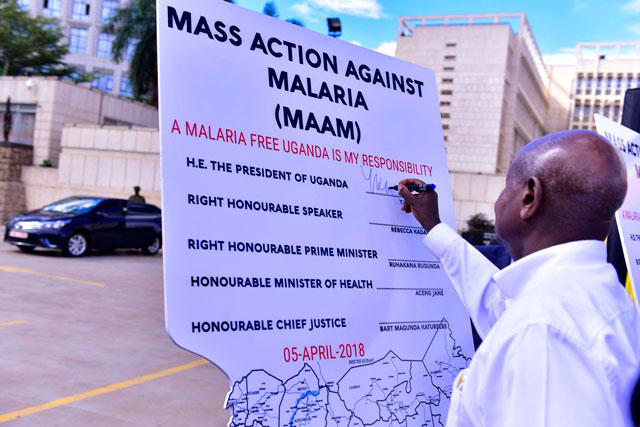
Global fight against malaria has stalled, WHO warns
Maputo, Mozambique | AFP | The World Health Organisation on Monday said global efforts to fight malaria have hit a plateau as it reported there were more cases of the killer disease in 2017 than the previous year.
The latest WHO report showed that the number of malaria cases climbed to 219 million last year, two million higher than 2016, while international funding has declined.
“The world faces a new reality,” WHO director-general Tedros Adhanom Ghebreyesus, warned as the UN agency launched the new report.
“As progress stagnates, we are at risk of squandering years of toil, investment and success in reducing the number of people suffering from the disease,” the WHO chief said.
Malaria, which is spread to people through the bites of infected female mosquitoes, occurs in 91 countries but about 90 percent of the cases and deaths are in sub-Saharan Africa.
Foreign funding to some of the most affected countries has declined, in certain instances by more than 20 percent for every individual at risk of contracting the disease.
“A considerable proportion of people at risk of infection are not being protected, including pregnant women and children in Africa,” the WHO chief said.
The disease killed 435,000 people last year, the majority of them children under five in Africa.
Another constraint in fighting malaria has been mosquitoes building up resistance to some commonly used insecticides, according to the report.
WHO said it was embarking on new ways to scale up the battle against one of the world’s deadliest diseases.
Nobody should die from #malaria, a disease that is preventable and treatable. But progress has stalled. We need a more efficient, effective and equitable response to #EndMalaria? #HealthForAll pic.twitter.com/y3qxS7tc9b
— Tedros Adhanom Ghebreyesus (@DrTedros) November 19, 2018
The plan includes country-led projects to “jumpstart aggressive” control efforts, said Kesete Admasu, who heads Roll Back Malaria, a global partnership initiative to curb the parasitic disease.
Mozambique is one of the target countries.
“Business as usual is no longer an option,” said Admasu.
Most malaria cases reported last year were in Burkina Faso, Cameroon, the Democratic Republic of the Congo, Ghana, India, Mali, Mozambique, Niger, Nigeria, Tanzania and Uganda.
Five countries accounted for nearly half of the cases: Nigeria (25 percent), DR Congo (11 percent), Mozambique (five percent), and India and Uganda with four percent each.
However countries such as Ethiopia, India, Pakistan and Rwanda recorded “substantial” declines in malaria cases.
RELATED STORY
Malaria kills 200 Ugandans everyday https://t.co/1Zy9txorGM pic.twitter.com/4XQzWSkBzP
— The Independent (@UGIndependent) April 30, 2018
World Malaria Day: Can Africa get out of the disease trap? https://t.co/1eyyUDWroL pic.twitter.com/LZXlV8zGDR
— The Independent (@UGIndependent) April 26, 2018
 The Independent Uganda: You get the Truth we Pay the Price
The Independent Uganda: You get the Truth we Pay the Price





Its everyone responsibility to control mosquitoes and live a safety life. Stop using plastics and remove wastages in a regular time interval which not allows water to stag over there. Fixing mosquito net will help you out. Make your environment clean to avoid mosquitoes.
Thank you for sharing this important update. The situation with malaria is indeed concerning, especially with the recent increase in cases and the decline in international funding. The fact that mosquitoes are developing resistance to insecticides adds another layer of complexity to the fight against this deadly disease. It’s crucial that the global community continues to innovate and invest in new strategies to combat malaria and protect vulnerable populations, particularly in sub-Saharan Africa. The efforts of WHO and other organizations in this battle are vital and need our support now more than ever.